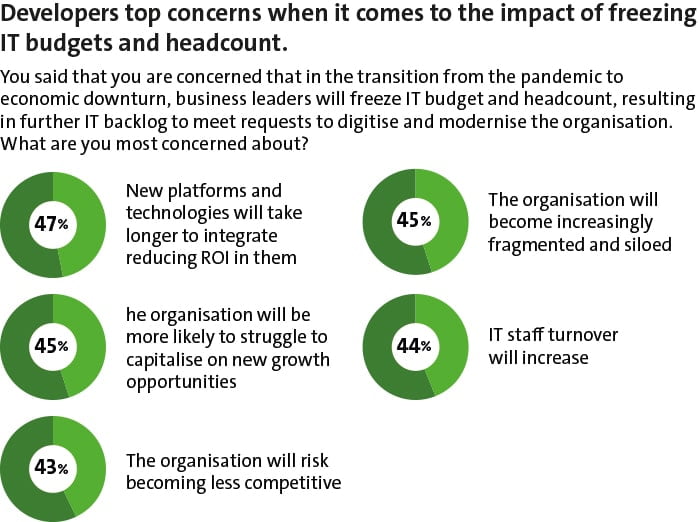Business process and IT processes


IT leaders identify key growth drivers
According to a new study by Appian, IT executives' ability to drive business agility may be short-lived, as seven out of 10 German participants say their company is already shifting focus from innovation projects to cost-cutting initiatives. This could halt the momentum generated by the rapid adoption of new technologies and solutions during the corona pandemic. It may also have a detrimental effect on business growth and technology transformation - at a time when flexibility and new ideas should be encouraged.

Developers and engineers
The study "From boom to bust: Why empowering developers is vital for business innovation" surveyed 1500 developers and software engineers in Europe. The German figures show that almost three quarters of respondents fully or partially agree with the fear that the transition from pandemic will lead to economic downturn. But that's not all: they also fear that companies will reduce IT budgets and cut staff, that IT backlogs will increase, and that digitization and modernization efforts will slow down.
Agility and organization
This is in marked contrast to the progress made during the pandemic, when fast action and innovation were required. More than nine out of ten respondents in Germany say their company has greatly accelerated its focus on IT-enabled business transformation over the past two years. Meanwhile, more than three-quarters say they rank highly as partners in corporate decision-making. However, organizations that fail to take advantage of developers' increased freedom of action run the risk of diminishing returns. When asked about the consequences of cutting IT budgets and staffing levels, German developers cited the following five main impacts: Loss of competitive supremacy; difficulty in capitalizing on new growth opportunities; longer integration of new platforms, which would reduce ROI; increasing turnover of IT staff; and increasing fragmentation and isolation of the business.
Market and strategies
The aim of the study was to find out how European software developers and engineers assess their companies' ability to innovate in the current market and what influence they have on corporate decision-making in the face of uncertainty.
The German participants in this study identify adapting business strategy to economic changes, leveraging new technologies and platforms, and focusing on core tasks as the three most important growth factors in the face of difficult economic conditions. When it comes to technology-enabled business decisions, the findings show that developers consider the need for optimized collaboration and better mutual understanding to be urgent.
Slightly more than one-third of German respondents say that there are too many data silos in the company. These prevent a comprehensive understanding of how IT is used. Nearly four in ten respondents say that business partners believe it is faster to seek solutions directly from IT vendors than to involve their own IT team. To overcome these challenges, more than seven in ten respondents in Germany believe that tomorrow's workforce will need to include more IT professionals with business skills and more business people with IT skills if companies are to be able to successfully manage change and grow.




